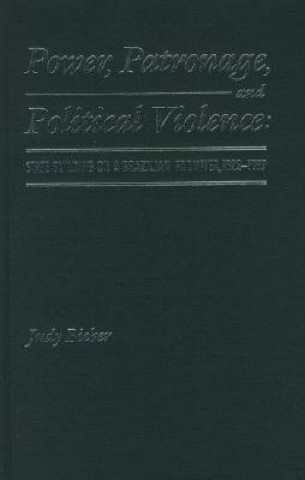
Kód: 04922361
Power, Patronage, and Political Violence
Autor Judy Bieber
Judy Bieber explores the relationship between state centralization and municipal politics in Minas Gerais, Brazil, during the Imperial Period, 1822-89. She charts the nineteenth-century origins of coronelismo, a form of machine po ... celý popis
- Jazyk:
 Angličtina
Angličtina - Väzba: Pevná
- Počet strán: 253
Nakladateľ: University of Nebraska Press, 1999
- Viac informácií o knihe

70.84 €

Skladom u dodávateľa v malom množstve
Odosielame za 10 - 14 dní
Potrebujete viac kusov?Ak máte záujem o viac kusov, preverte, prosím, najprv dostupnosť titulu na našej zákazníckej podpore.
Pridať medzi želanie
Mohlo by sa vám tiež páčiť
-

Tax Policy and the Economy
74.83 € -

Yeats and English Renaissance Literature
139.54 € -

Evolution of a Farming Community in the Upper Thames Valley
36.44 € -

Bridling of the Tongue and the Opening of the Mouth in Biblical Prophecy
358.04 € -

Salem's Daughter: The Haunting
19.65 € -

Death Throes of a Dynasty
59.68 € -

In Blood We Trust
14.12 €
Darčekový poukaz: Radosť zaručená
- Darujte poukaz v ľubovoľnej hodnote, a my sa postaráme o zvyšok.
- Poukaz sa vzťahuje na všetky produkty v našej ponuke.
- Elektronický poukaz si vytlačíte z e-mailu a môžete ho ihneď darovať.
- Platnosť poukazu je 12 mesiacov od dátumu vystavenia.
Viac informácií o knihe Power, Patronage, and Political Violence
Nákupom získate 175 bodov
 Anotácia knihy
Anotácia knihy
Judy Bieber explores the relationship between state centralization and municipal politics in Minas Gerais, Brazil, during the Imperial Period, 1822-89. She charts the nineteenth-century origins of coronelismo, a form of machine politics that linked rural power and patronage at the municipal level to state and federal politics. By highlighting the structural role of the municipality within the political system, Bieber provides a key to explaining Brazil's so-called exceptionalism - its ability to maintain territorial and political cohesion within the framework of a constitutional monarchy instead of fragmenting violently, as did many Spanish republics. Despite the maintenance of national unity, political violence characterized much of Brazil's political history, especially in the municipalities of its frontier regions. Historians have often attributed the chaotic nature of these politics to geographical isolation and decentralization of power. Bieber challenges these assumptions, arguing instead that state centralization was the primary factor contributing to political violence in Brazil's frontier regions. The Brazilian national government centralized appointments of municipal authorities, thereby linking partisan affiliation on the periphery with provincial and national political parties. Local appointees corrupted and abused the mechanisms of social control in order to attain electoral victories for political patrons who had rewarded them with official jobs. This system produced escalating violence and promoted judicial impunity at the municipal level while simultaneously creating political stability at the provincial and federal levels. National discourse attributed political violence to a natural tendency possessed by rural elites in the uncivilized backlands. Municipal actors, however, belied prevailing stereotypes of ideological passivity and intellectual backwardness. In the press and in private correspondence they actively sought to define the terms of their political participation, developing their own conceptions of liberalism and ethical norms of political patronage. Judy Bieber is an assistant professor of history at the University of New Mexico.
 Parametre knihy
Parametre knihy
Zaradenie knihy Knihy po anglicky Society & social sciences Politics & government Political control & freedoms
70.84 €
- Celý názov: Power, Patronage, and Political Violence
- Podnázov: State Building on a Brazilian Frontier, 1822-1889
- Autor: Judy Bieber
- Jazyk:
 Angličtina
Angličtina - Väzba: Pevná
- Počet strán: 253
- EAN: 9780803212978
- ID: 04922361
- Nakladateľ: University of Nebraska Press
- Hmotnosť: 510 g
- Rozmery: 229 × 152 × 25 mm
- Dátum vydania: 01. December 1999
Obľúbené z iného súdka
-

The Gulag Archipelago
14.94 € -23 % -

On Palestine
14.73 € -19 % -

Propaganda
15.55 € -4 % -

Gift of Love
11.15 € -23 % -

In Order To Live
11.35 € -

Manufacturing Consent
14.43 € -23 % -

Understanding Power
18.73 € -23 % -

Anatomy of the State
13.20 € -19 % -

Long Walk To Freedom
15.25 € -21 % -

Half the Sky
13.71 € -19 % -

On Liberty
11.15 € -23 % -

Red Horizons
17.19 € -19 % -

How Propaganda Works
21.49 € -12 % -

Creating Capabilities
21.80 € -6 % -

I Have a Dream
15.55 € -15 % -

Fear No Evil
17.19 € -19 % -

In Harm's Way
73.20 € -

Handbook of Tyranny
32.45 € -7 % -

Zinnophobia
40.53 € -5 % -

Nothing To Envy
9.41 € -21 % -

The Gulag Archipelago, 1918-1956
18.83 € -22 % -

The Gulag Archipelago, 1918-1956
18.83 € -22 % -

Human Rights: A Very Short Introduction
9.10 € -24 % -

Inventing Human Rights
18.11 € -1 % -

New Jim Crow
12.28 € -23 % -

Political Philosophy: A Very Short Introduction
9.10 € -24 % -

Cultural Cold War
20.47 € -18 % -

Commissar Vanishes
29.07 € -

Rights of Man
7.98 € -22 % -

Anatomy of the State
8.49 € -

Constructing Cassandra
41.87 € -

Gulag Archipelago
18.73 € -23 % -

International Law: A Very Short Introduction
9.10 € -24 % -

Anarcho-Fascism
19.75 € -

The Net Delusion
12.28 € -23 % -

Orwell on Truth
14.63 € -24 % -

Uncreative Writing
22.82 € -9 % -

Soul of America
26.51 € -15 % -

Parkland: Birth of a Movement
21.18 € -13 % -

Satow's Diplomatic Practice
111.39 € -

Universal Human Rights in Theory and Practice
38.18 € -

Legitimacy of International Human Rights Regimes
53.03 € -

Art of Revolt
21.90 € -13 % -

Domination and the Arts of Resistance
24.46 € -

Desert and the Sea
13.20 € -17 % -

Witness for the Defense
23.23 € -4 % -

Sociology of Human Rights
34.80 € -

Terrorism, Rights and the Rule of Law
67.87 € -

Suffragettes
3.57 € -24 %
Osobný odber Bratislava a 2642 dalších
Copyright ©2008-24 najlacnejsie-knihy.sk Všetky práva vyhradenéSúkromieCookies


 19 miliónov titulov
19 miliónov titulov Vrátenie do mesiaca
Vrátenie do mesiaca 02/210 210 99 (8-15.30h)
02/210 210 99 (8-15.30h)